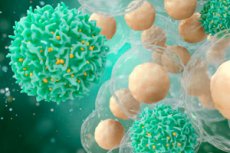New publications
Scientists discover key to activating natural killer cells against cancer
Last reviewed: 02.07.2025

All iLive content is medically reviewed or fact checked to ensure as much factual accuracy as possible.
We have strict sourcing guidelines and only link to reputable media sites, academic research institutions and, whenever possible, medically peer reviewed studies. Note that the numbers in parentheses ([1], [2], etc.) are clickable links to these studies.
If you feel that any of our content is inaccurate, out-of-date, or otherwise questionable, please select it and press Ctrl + Enter.

Scientists are on the brink of a breakthrough in cancer treatment after discovering how the body's immune system targets cells affected by the disease.
New research has found that our natural killer cells, part of the immune system that protects the body from disease and infection, instinctively recognise and attack a protein that promotes cancer growth.
Experts say that by manipulating this protein, known as XPO1, they can activate more killer cells to destroy cancer cells.
Scientists from the University of Southampton, working in collaboration with experts from around the world, led the research and now believe it could offer new, less invasive treatments.
The results of the study were published in the journal Science Advances.
Salim Haku, professor of hepatology at the University of Southampton and lead author of the study, said it was previously thought that killer cells attack cancer cells randomly.
"Our results show how our body's immune system recognises and attacks these cancer cells," said Professor Haku.
"Killer cells are a new form of immunotherapy that shows great potential. They don't attack healthy tissue the way chemotherapy and other immunotherapies do, so they are safer and cause fewer side effects than traditional cancer treatments."
The XPO1 protein that the scientists studied is essential for normal cell function. However, in many types of cancer, it becomes overactive, allowing malignant cells to multiply uncontrollably.
Scientists at the University of Southampton have discovered that a peptide - short chains of amino acids derived from the protein XPO1 - attracts natural killer cells. This, they say, triggers the body's immune response against cancer cells.
Professor Haku added: “Cancer patients who had both active killer cells and high levels of XPO1 had significantly better survival rates. This is true for a range of cancers, including those with high mortality rates, such as liver cancer, where the average survival is just 18 months. In the future, treatments using killer cells could be used to treat cancers of the head and neck, endometrium, bladder or breast.”
Previous studies have linked natural killer cells to protecting the body from cancer. However, the latest study is the first of its kind to highlight a viable technique for activating killer cells by targeting the XPO1 protein to fight the disease.
Co-author of the study, Professor Ralph Schittenhelm from Monash University in Australia, said the discovery could change the course of immunotherapy.
"We hope this will lead to personalised cancer treatments, particularly in cases where traditional treatments have failed. The potential for developing targeted therapies that use the body's own immune system is extremely exciting."
A Southampton scientific team is currently working on creating the world's first vaccine that uses natural killer cells to fight cancer.
